Chubb Bundle
Who Really Owns Chubb?
Understanding the ownership structure of a global insurance giant like Chubb is crucial for investors and business strategists alike. The 2016 acquisition of The Chubb Corporation by ACE Limited marked a pivotal moment, reshaping the industry landscape. This merger created a world leader, but who ultimately controls its destiny?
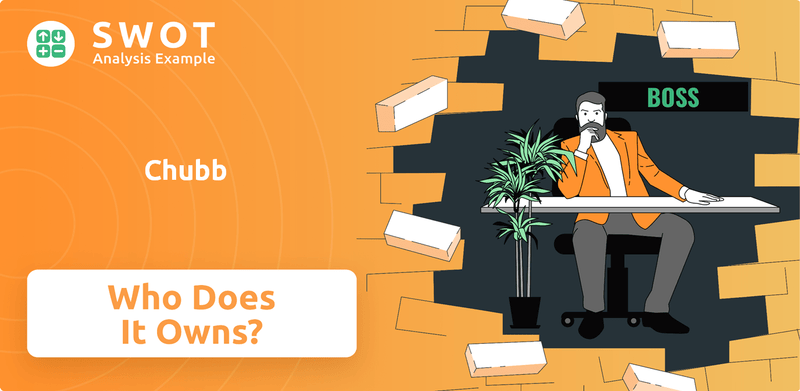
Chubb Ltd, a titan in the insurance world, operates across 54 countries and boasts a market capitalization of approximately $115.01 billion to S$146.48 billion as of June 2025. Its history, from its founding in Bermuda to its current headquarters in Zurich, is a testament to its growth. To gain deeper insights, consider a comprehensive Chubb SWOT Analysis to understand its strategic positioning within the market and its competitive advantages.
Who Founded Chubb?
The story of Chubb's origins begins in 1882 with Thomas Caldecot Chubb and his son Percy. They established a marine underwriting business in New York City. Their initial focus was on insuring ships and their cargo, starting with $1,000 collected from a hundred merchants.
However, the company known today as Chubb Limited emerged in 1985. It was founded as ACE (American Casualty Excess) Limited in Hamilton, Bermuda. This formation was a direct response to a crisis in the U.S. insurance market. The market was facing challenges related to the availability of excess liability and directors and officers insurance.
While the specific ownership details of ACE Limited's founding are not publicly available, the company was created to fill a crucial gap in the insurance sector. Over time, ACE expanded through strategic moves, including product diversification and acquisitions.
Thomas Caldecot Chubb and his son Percy started the business in 1882. They focused on marine insurance, covering ships and their cargo.
ACE Limited was established in 1985 in Bermuda. It was created to address the lack of excess liability and directors and officers insurance in the U.S.
ACE expanded through product diversification, strategic partnerships, and acquisitions. This helped the company grow and strengthen its market position.
A significant acquisition was the purchase of Cigna Corporation's property and casualty business in 1999. This gave ACE a global presence.
The ownership structure of Chubb has evolved over time. This evolution reflects the company's growth and strategic acquisitions.
Today, Chubb is a publicly traded company. Investors can find information about its stock on major exchanges.
Understanding the history of Chubb ownership is crucial for investors. The company's journey from a marine insurance startup to a global player showcases its adaptability. The acquisition of Cigna's business was a pivotal moment, shaping its international footprint. For more insights into Chubb insurance company's marketing strategies, you can explore the Marketing Strategy of Chubb.
- Chubb's origins are rooted in marine insurance, founded in 1882.
- ACE Limited was established in 1985 to address specific insurance market needs.
- The acquisition of Cigna's business in 1999 was a major strategic move.
- Today, Chubb Ltd is a publicly traded company, and information about Chubb stock is readily available.
Chubb SWOT Analysis
- Complete SWOT Breakdown
- Fully Customizable
- Editable in Excel & Word
- Professional Formatting
- Investor-Ready Format
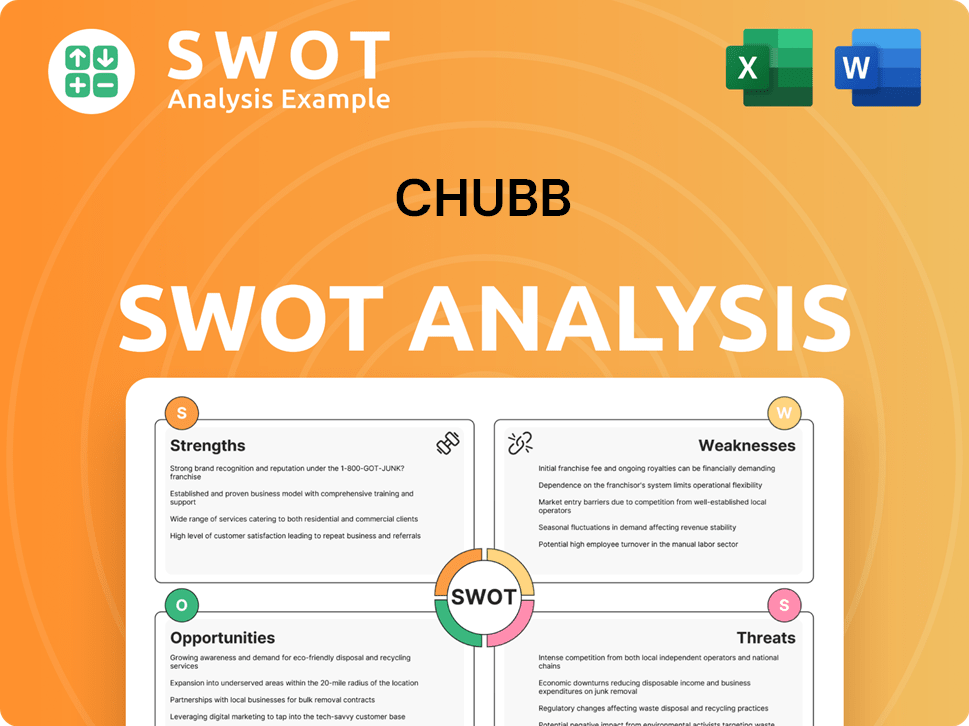
How Has Chubb’s Ownership Changed Over Time?
The ownership structure of Chubb Ltd has been shaped by significant events, including its initial public offering (IPO) and subsequent mergers and acquisitions. The company went public on March 24, 1993, and has since seen its ownership evolve, with institutional investors gaining considerable influence. The 2016 merger with ACE Limited was a pivotal moment, reshaping the company's operational scope and, indirectly, its ownership through capital allocation and potential share issuances. Recent acquisitions, such as Liberty Mutual's P&C businesses in Thailand and Vietnam in March 2025, further demonstrate Chubb's growth strategy and its impact on the ownership landscape.
As of June 2025, Chubb's market capitalization is approximately $115.01 billion to S$146.48 billion, reflecting its substantial presence in the insurance industry. The company's ownership is largely dominated by institutional investors, who held 83.81% of the shares as of the first quarter of 2025. This concentration of ownership highlights the importance of institutional investors in shaping Chubb's strategic direction and governance. A deeper understanding of Growth Strategy of Chubb provides more insights into the company’s direction.
| Ownership Category | Percentage of Shares (Q1 2025) | Major Shareholders (May 2025) |
|---|---|---|
| Institutional Investors | 83.81% | Vanguard Group Inc. (9.12%), BlackRock, Inc. (6.99%), Berkshire Hathaway Inc. (6.75%) |
| Insider Holdings | 0.32% (January 2025) | Evan G. Greenberg (0.12% as of December 15, 2024) |
| Market Capitalization | Approximately $115.01 billion to S$146.48 billion (June 2025) |
The major institutional shareholders, including Vanguard Group Inc., BlackRock, Inc., and Berkshire Hathaway Inc., collectively hold a significant portion of Chubb's stock. Berkshire Hathaway's investment, revealed in a May 2024 regulatory disclosure, indicates a substantial stake acquired since 2023. Insider holdings, primarily comprising company executives and board members, represent a smaller percentage of the overall ownership. Evan G. Greenberg, Chairman and CEO, is a key insider, holding a notable number of shares. The company's leadership and strategic decisions are significantly influenced by these major shareholders, who actively engage with management on various issues.
Chubb's ownership is primarily controlled by institutional investors, indicating a strong influence from major financial entities.
- Institutional investors held 83.81% of shares as of Q1 2025.
- Major shareholders include Vanguard, BlackRock, and Berkshire Hathaway.
- The CEO, Evan G. Greenberg, holds a significant insider stake.
- The market capitalization is approximately $115.01 billion to S$146.48 billion as of June 2025.
Chubb PESTLE Analysis
- Covers All 6 PESTLE Categories
- No Research Needed – Save Hours of Work
- Built by Experts, Trusted by Consultants
- Instant Download, Ready to Use
- 100% Editable, Fully Customizable
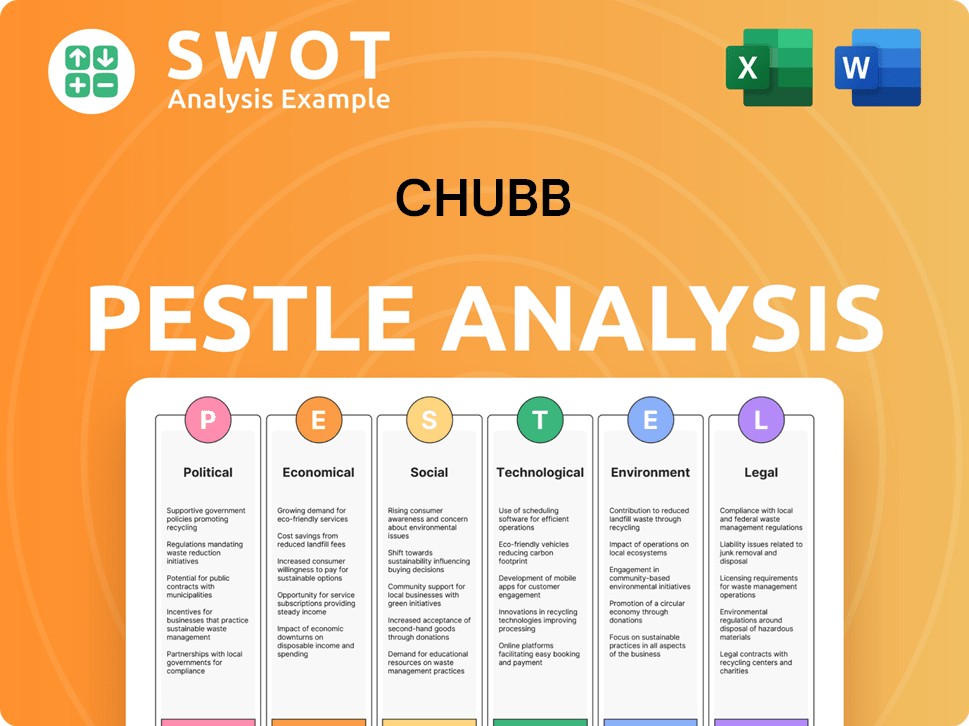
Who Sits on Chubb’s Board?
The Board of Directors at Chubb Limited oversees the company's strategic direction and governance. As of April 2025, the board includes a mix of executive, non-executive, and independent directors. Evan G. Greenberg holds the positions of Chairman and Chief Executive Officer. Other key members include Michael P. Connors, who also serves as Lead Director, Michael L. Corbat, David H. Sidwell, and Frances F. Townsend.
The composition of the board reflects a blend of experience and expertise, guiding the company's operations in the insurance sector. The board's role is pivotal in ensuring accountability and making key decisions that impact the company's performance and shareholder value. The board's structure and the individuals within it are critical to the company's ability to navigate the complexities of the insurance market and maintain its competitive position. The board's decisions and oversight are central to the company's strategic initiatives and financial health.
| Board Member | Title | Role |
|---|---|---|
| Evan G. Greenberg | Chairman & Chief Executive Officer | Oversees all aspects of the company's operations. |
| Michael P. Connors | Lead Director | Provides leadership and oversight to the board. |
| Michael L. Corbat | Director | Contributes to strategic decision-making. |
Chubb's voting structure generally follows a one-share-one-vote system, which is typical for companies listed on the New York Stock Exchange (NYSE). Shareholders have the right to vote on important matters, such as electing directors, approving executive compensation, and ratifying the company's auditors. At the 2025 Annual General Meeting, shareholders approved a 6.6% increase in the company's dividend, showing alignment with the board's recommendations on key agenda items. The significant institutional ownership, with entities like Vanguard Group Inc., BlackRock, Inc., and Berkshire Hathaway Inc. holding substantial shares, gives these investors considerable influence over voting outcomes.
Chubb's ownership is primarily held by institutional investors. As of May 2025, institutional investors hold approximately 90.01% of the company's shares. This high level of institutional ownership means that the voting power is concentrated among major investment firms.
- Vanguard Group Inc., BlackRock, Inc., and Berkshire Hathaway Inc. are the largest shareholders.
- These firms collectively have a significant impact on shareholder proposals and director elections.
- There have been no recent proxy battles that significantly reshaped decision-making.
- Understanding the ownership structure is key to understanding the company's governance.
Chubb Business Model Canvas
- Complete 9-Block Business Model Canvas
- Effortlessly Communicate Your Business Strategy
- Investor-Ready BMC Format
- 100% Editable and Customizable
- Clear and Structured Layout
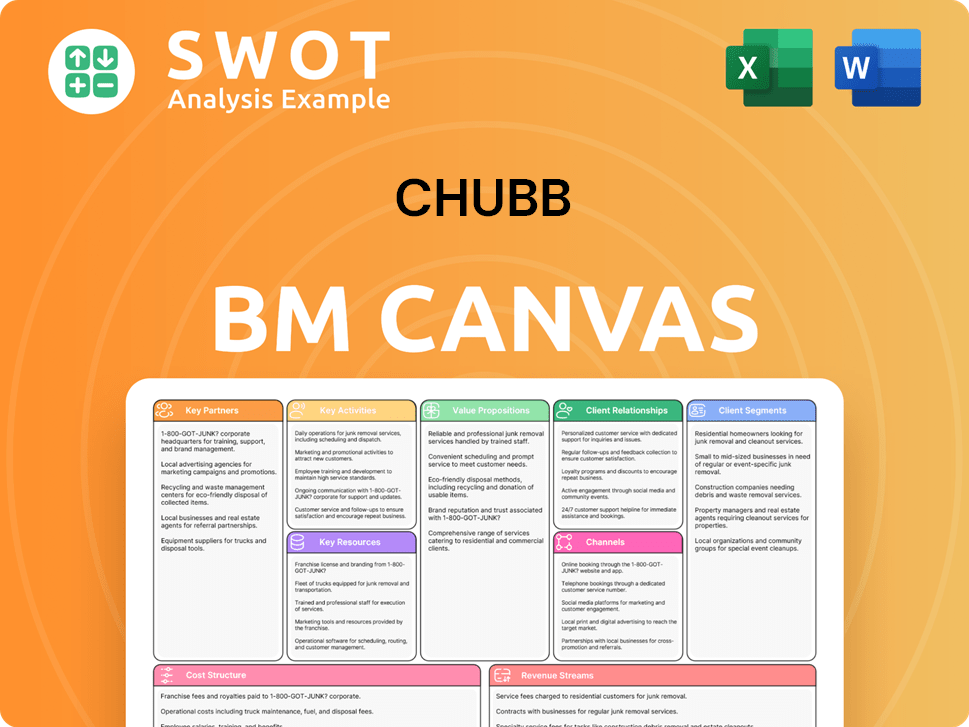
What Recent Changes Have Shaped Chubb’s Ownership Landscape?
Over the past few years, the ownership structure of the Chubb insurance company has seen steady evolution, primarily influenced by institutional investment patterns, strategic acquisitions, and capital return strategies. As of May 2025, institutional investors held a dominant 90.01% of the company's shares, indicating a high level of confidence from this segment. This figure was slightly higher at 91.56% in January 2025, showing a consistent trend. Insider holdings remained minimal at 0.32% in January 2025, while mutual funds experienced a slight decrease in their holdings, moving from 71.49% to 71.01% during the same period.
Share buybacks have been a key part of Chubb Ltd's capital management. In 2024, the company repurchased $2.0 billion of shares. Shareholders approved a new $5 billion share repurchase program effective July 1, 2025, demonstrating the company's commitment to returning capital to shareholders. This program, which has no expiration date, allows for repurchases in the open market or through privately negotiated transactions. The ownership structure of the company is also influenced by mergers and acquisitions, with recent activity including the acquisition of Liberty Mutual's property and casualty insurance businesses in Thailand and Vietnam in March 2025.
| Ownership Category | January 2025 | May 2025 |
|---|---|---|
| Institutional Ownership | 91.56% | 90.01% |
| Insider Holdings | 0.32% | N/A |
| Mutual Funds | 71.49% | 71.01% |
The leadership of the company remains stable, with Evan G. Greenberg as Chairman and CEO. Analyst sentiment as of April 2025 suggests cautious optimism, with an average price target of $301.06, potentially exceeding the trading price of $282.66. The company also continues to invest heavily in technology, allocating between $1.1 and $1.2 billion annually to modernize systems and enhance AI-driven analytics, helping maintain a low expense ratio in the P&C sector. The consistent dividend increases, marking the 32nd consecutive annual hike in 2025 to $3.88 per share, also reflect a stable and shareholder-friendly ownership trend. To learn more about the company's target market, you can read this article: Target Market of Chubb.
Institutional ownership remains dominant, indicating confidence.
Significant share buybacks and a new $5 billion program are in place.
Acquisitions in Thailand and Vietnam expand global presence.
Stable leadership and cautious analyst optimism are observed.
Chubb Porter's Five Forces Analysis
- Covers All 5 Competitive Forces in Detail
- Structured for Consultants, Students, and Founders
- 100% Editable in Microsoft Word & Excel
- Instant Digital Download – Use Immediately
- Compatible with Mac & PC – Fully Unlocked
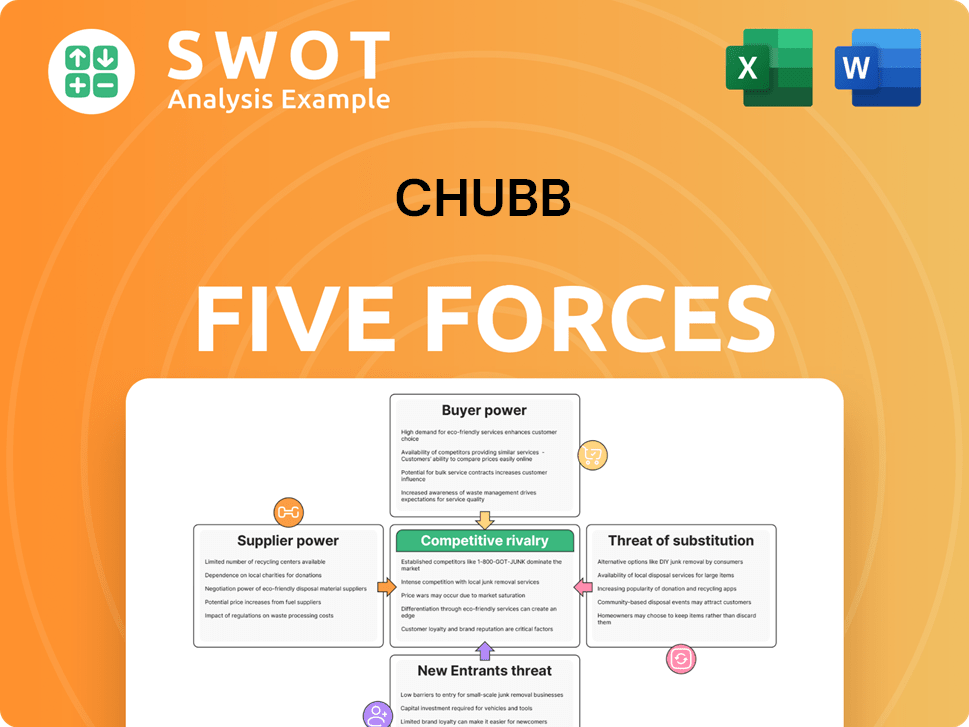
Related Blogs
- What are Mission Vision & Core Values of Chubb Company?
- What is Competitive Landscape of Chubb Company?
- What is Growth Strategy and Future Prospects of Chubb Company?
- How Does Chubb Company Work?
- What is Sales and Marketing Strategy of Chubb Company?
- What is Brief History of Chubb Company?
- What is Customer Demographics and Target Market of Chubb Company?
Disclaimer
All information, articles, and product details provided on this website are for general informational and educational purposes only. We do not claim any ownership over, nor do we intend to infringe upon, any trademarks, copyrights, logos, brand names, or other intellectual property mentioned or depicted on this site. Such intellectual property remains the property of its respective owners, and any references here are made solely for identification or informational purposes, without implying any affiliation, endorsement, or partnership.
We make no representations or warranties, express or implied, regarding the accuracy, completeness, or suitability of any content or products presented. Nothing on this website should be construed as legal, tax, investment, financial, medical, or other professional advice. In addition, no part of this site—including articles or product references—constitutes a solicitation, recommendation, endorsement, advertisement, or offer to buy or sell any securities, franchises, or other financial instruments, particularly in jurisdictions where such activity would be unlawful.
All content is of a general nature and may not address the specific circumstances of any individual or entity. It is not a substitute for professional advice or services. Any actions you take based on the information provided here are strictly at your own risk. You accept full responsibility for any decisions or outcomes arising from your use of this website and agree to release us from any liability in connection with your use of, or reliance upon, the content or products found herein.